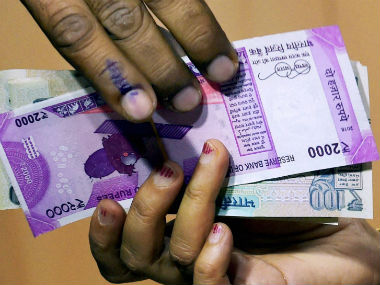New Delhi: The Budget prescribing a Rs 7.5 lakh per annum cumulative upper ceiling for tax-free contribution by employers under employee provident fund (EPF), National Pension System (NPS) and superannuation fund will impact only those with an annual salary of more than Rs 60 lakh, Revenue Secretary Ajay Bhushan Pandey said on Monday. The proposal is not something unique to India as similar ones are followed in other countries as well, he said. Pandey further said taxing dividend income at the hands of the receiver is “most fair” rather than charging a dividend distribution tax (DDT) on the companies paying dividend because the rate of tax levied is then decided on the basis of the total income of the recipient. [caption id=“attachment_4279271” align=“alignleft” width=“380”] Representational image. PTI[/caption] Speaking about the Budget provision that proposed a combined upper limit on tax-free employers’ contribution towards the NPS, superannuation fund and provident fund at Rs 7.5 lakh annually for an employee, Pandey said if there is no limit, it will allow structuring of the salary into various components to lower the tax outgo. “If you consider the Rs 7.5 lakh (threshold), it will affect only those with an annual salary of more than Rs 60 lakh,” Pandey said at a post-Budget interaction organised by Ficci. “Having no limit also allows structuring of the salary into various components where this particular thing could be hiked up and then actual tax could be very less. This threshold is not something very very unusual we have done. It is being developed in many parts of the world,” he added. Under the existing provisions, the contribution by the employer to a recognised provident fund exceeding 12 percent of salary is taxable. The Budget 2020-21 also proposed to withdraw DDT saying that henceforth, the tax will have to be paid by the recipients at the applicable rate. Currently, companies are required to pay dividend distribution tax (DDT) on the dividend paid to its shareholders at the rate of 15 percent plus applicable surcharge and cess, in addition to the tax payable by the company on its profits. The total rate works out to be 20.5 percent. Pandey said there has been a demand from every section of industry that DDT is “very very regressive” on many counts particularly for retail investors falling in lower tax slab and, hence, the government has accepted in principle that it should be taxed at the hands of investors at applicable rate. Also, foreign investors were unable to claim credit in their home country because DDT did not exactly qualify as an income tax. “We did a study on how dividends are taxed in various parts of the world. In many jurisdictions, it is taxed at the applicable rate and that seems to be most fair. The best option available is that it should be charged at the applicable rate and that should be (calculated as) part of income because every income is taxed at applicable rate and then nobody will have grudge,” Pandey said. The DDT has been in place for more than 20 years. In 2002, it was abolished but in 2003, it was brought in again.
Under the existing provisions, the contribution by the employer to a recognised provident fund exceeding 12 per cent of salary is taxable.
Advertisement
End of Article


)

)
)
)
)
)
)
)
)



